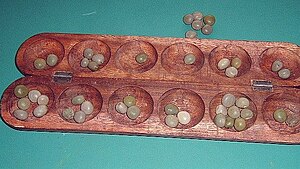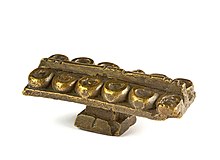Oware
Oware is an abstract strategy game from the Mancala family that is played in West Africa and some Caribbean islands . Oware is the national game in Ghana .
Rules of the game
Beginning
The game board consists of two by six hollows. At the beginning of the game, there are four game pieces in each hollow. Each player owns the six hollows on his side of the board. Two profit hollows, empty at the beginning, are optional.
The players take turns moving and it is mandatory to move. The player on the move may count the stones in his hollows, he may also take them in his hand. He does not need to tell the opponent the number.
Sow
The player to move chooses one of his hollows that is not empty, removes all stones from it and puts one of them in each subsequent hollow, around the board in an anti- clockwise direction . Arrived at the right end of your own row, continue from right to left on the opponent's row, then starting again on the left on your own row. Profit troughs, if any, are skipped. The trough from which the stones were removed is also skipped.
To catch
If the last stone that was sown falls into a hollow on the opposing side and there are now two or three stones in this hollow, then these stones are removed by the drawing player and placed in his winning trough (or next to the board, if there are no winning troughs). Then the hollow in front of it, into which the penultimate stone fell, is also considered. If there are two or three stones here, too, they also go to the puller. This continues until you come to a hollow with fewer than two or more than three stones, or a hollow on your own side. These and all others are not emptied.
If all the stones were caught in the opposing hollows, it is called the "Grand Slam". A move that leads to this situation is allowed in the Abapa variant (the standard tournament rules), but nothing is caught; the opposing hollows are not emptied.
Feed
When all the opponent's hollows are empty, you have to make a move that gives the opponent at least one stone so that he can then make a move. If this is not possible, the game ends.
The End
If the player cannot move to move, the game ends. The game also ends if a player has caught more than 24 stones and thus more than half of the stones in play, since the opponent can then no longer catch up. If the players agree that an endless cycle has been created, the game also ends; it is then ended at a time when both players have at least one stone on their side.
At the end of the game, each player takes the stones from his hollows to add to his prisoners. The winner is the player with the most stones caught. If both stones have 24 stones, the game ends in a draw.
Related games
Closely related games with very similar rules are:
- Ayo ( Yoruba , Nigeria )
- Awalé ( Ivory Coast )
- Awélé ( Ga , Ghana)
- Baule (Ivory Coast)
- Adji ( Ewe , Togo )
- Ti ( Mende , Sierra Leone )
- Ouril ( Cape Verde Islands )
- Awari (coastal region of Guiana and Surinam )
- Ware ( Burkina Faso )
- Warri (Caribbean)
Kalaha is a modern variant of Mancala from William Julius Champion.
literature
- Kovach, RP Oware: The National Game of Africa . Morrison Quick Print, Oakland CA (USA) 1995.

